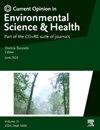生物杀虫剂对节肢动物天敌的非靶效应研究
IF 6.6
Q1 ENVIRONMENTAL SCIENCES
Current Opinion in Environmental Science and Health
Pub Date : 2025-04-28
DOI:10.1016/j.coesh.2025.100624
引用次数: 0
摘要
由于合成杀虫剂损害了有益节肢动物提供的生态系统服务,生物杀虫剂作为一种更可持续的农业有害生物管理方法在世界范围内引起了人们的兴趣。虽然生物杀虫剂被认为对非目标物种是安全的,但对节肢动物天敌仍然有不利影响。本文综述了近两年来植物性和微生物性生物杀虫剂非靶标效应的研究进展,重点介绍了植物性和微生物性生物杀虫剂对天敌和拟寄生虫的致死和亚致死毒性评价。精油显示出与拟寄生虫的良好相容性,但它们对捕食者的影响是可变的。在微生物中,大多数实验都是在真菌中进行的,其次是细菌和病毒,它们具有不同的终点,因此与生物防治剂的一般相容性,但有些结果存在争议。应进行进一步的实验室研究以改进生物杀虫剂配方。需要进行广泛的实地研究,以评估个人和社区水平上更复杂的亚致死终点。本文章由计算机程序翻译,如有差异,请以英文原文为准。
Non-target effects of bioinsecticides on natural enemies of arthropod pests
As synthetic insecticides impair the ecosystem services provided by beneficial arthropods, bioinsecticides are gaining interest worldwide as a more sustainable approach to agricultural pest management. Although supposedly considered safe for non-target species, bioinsecticides can still have adverse effects on arthropod natural enemies. This review aims to summarise the literature of the last two years on the non-target effects of botanical and microbial bioinsecticides focussing on the evaluation of lethal and sublethal toxicity to predators and parasitoids. Essential oils show promising compatibility with parasitoids, but their effects on predators are variable. Among microbials, most of the experiments have been conducted with fungi followed by bacteria and viruses with different endpoints, resulting in a general compatibility with biocontrol agents but some results are controversial. Further laboratory studies should be carried out to improve bioinsecticide formulations. Extensive field studies are needed to assess more complex sublethal endpoints at the individual and community levels.
求助全文
通过发布文献求助,成功后即可免费获取论文全文。
去求助
来源期刊

Current Opinion in Environmental Science and Health
Medicine-Public Health, Environmental and Occupational Health
CiteScore
14.90
自引率
0.00%
发文量
92
审稿时长
114 days
 求助内容:
求助内容: 应助结果提醒方式:
应助结果提醒方式:


